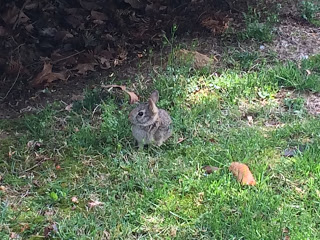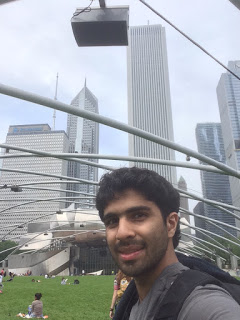Neuroscience
Among my classes this past semester was an upper-level logic course taught by Dr. David McCarty. From day one of the class, I knew I was in for a wild ride. Imagine a class of 30 students in a small, somewhat-adequately lit room with no windows. The desks sat close to one another with pieces of water and ice on the floor from the snowy walk to class. I looked around to see only a few familiar faces. This desolate atmosphere was only matched by daily quizzes and automatic course failure for tardiness or phone disruption. Keep in mind: this is a logic class. We would teach ourselves how to complete fundamental and rigorous proofs and theorems as though we questioned the reasoning of reasoning itself. And, like all the ironic tendencies of the universe, the course was amazing.
It should not come as a surprise that there were only about 20 students remaining in the course by the end, and it should not be surprising that we struggled a lot. As students, we were forced to ask questions and give answers. There was no spoon-feeding nor hand-holding. It was only questions and answers from the students and professors. Learning logic was a group passion, if there could be such a thing as that. Like a Socratic dialogue that forced us to make something of ourselves, Dr. McCarty lead our winding journey through database models and recursive relations that pushed the boundaries of what could be taught in any course: be it math, science, or philosophy.
(Programs for recursive relations can also explain how rabbit populations increase over time. Just look at how far I've come along the way too!)
Anyways, during the last week of the course (as we had all mostly accepted our fate), we explored the history of logic for a bit. Maybe you have noticed that I have been sparing the reader many of the difficult and intricate details of logic and mathematics (so as not to be a bore), but, being at the crossroads of philosophy, mathematics, and science, the lives of various mathematicians, scientists, and philosophers who could study a field that would otherwise seem incredibly trivial to someone really makes you stop and wonder. Perhaps there is more to mathematics than just being a tool for scientists? Is there an aesthetic or an epistemic quality to it? The course allowed me to understand what the natural world really meant to us, human beings. In other words, it was kind of cool.
Last week I began my internship at the University of Chicago. Quite similar to my experience at Cornell University last summer, I'm working on a bioinformatics project at the Conte Center for Computational Neuropsychiatric Genomics. Those are some big words that basically mean I push buttons on a computer and look at numbers until I learn something or other. Mostly I look at the DNA of the brain.
Before I finish, I need to mention that logic doesn't actually tell you how things work. Unlike the empirical sciences that may have elements of reductionist phenomena (such as how Chemistry can explain biological phenomena or Physics can explain chemical phenomena), logic is truly its own monster. I will (hopefully) write more about actual content of logic and science in upcoming posts. As for the actual reasons why we do things, perhaps those reasons are best left unanswered for now. For Kant once wrote:
Finally, I'm proud to announce that I will be writing for the Indiana Daily Student in the Fall. More greatness to come! I promise!
- Our Obsession With Bullshit Science Of Morals
Morals under the microscopeExplaining morals, religion, governance, and similar concepts using science seems like an attractive proposition at first, but the scientific inquiry will never give complete answers to questions reserved for philosophy, history,...
- A Theory Of Everything, For Everyone
Read this article in the Indiana Daily Student here.... Hilbert's tombSince a theory of everything would all the forces of matter, it would be elegant in how much information could be explained so simply. The math and physics behind theory would all...
- The Pre-medical Motive: Curiosity, Practicality, And Numbers
We are what we learn. As a lie in the bedroom of my dorm, I have only a few weeks left of classes for this semester. This summer I will have the wonderful opportunity of performing research at the Conte Center of the University of Chicago. ...
- What Pre-medical Students Can Learn From The Humanities
As I finish writing my final lab report for my Intermediate Physics Lab, the fall semester of my sophomore year comes to a slow, much-needed end. I've taken some time to reflect on the impact my classes have had since the beginning of the year. This...
- Beginning My Summer Research Internship - On Bioinformatics And Math And Everything
What do you get when you combine running and nature, two of my favorite interests? Pictured: natureCornell University, aka, the place where everyone runs and worships trees. Last Saturday I moved into a residence hall with ~20 other students as part of...
Neuroscience
Logic and the Crossroads of Philosophy, Mathematics, and Science
Though I'm studying a wide breadth of math, science, and philosophy courses, I never really had much of an interest in the philosophy of science. Every now and then, I would find myself reading up about ethics, linguistics, art history, but even the philosophy of science seemed like irrelevant disputing of semantics and terms that don't tell us very much. Why should I care whether our scientific knowledge is going through a paradigm shift or some other type of cycle? I once liked to heed to Feynman's quote "The philosophy of science is as useful to scientists as ornithology is useful to birds." However true it may be that the philosophy of science is useful and amazing to study, it never seemed too relevant to me, as a lad interested in the natural sciences and mathematics. I preferred to leave philosophy to philosophy and leave science to science. But, like many stories, this one has a turning point. (insert "meta" joke here)
Among my classes this past semester was an upper-level logic course taught by Dr. David McCarty. From day one of the class, I knew I was in for a wild ride. Imagine a class of 30 students in a small, somewhat-adequately lit room with no windows. The desks sat close to one another with pieces of water and ice on the floor from the snowy walk to class. I looked around to see only a few familiar faces. This desolate atmosphere was only matched by daily quizzes and automatic course failure for tardiness or phone disruption. Keep in mind: this is a logic class. We would teach ourselves how to complete fundamental and rigorous proofs and theorems as though we questioned the reasoning of reasoning itself. And, like all the ironic tendencies of the universe, the course was amazing.
It should not come as a surprise that there were only about 20 students remaining in the course by the end, and it should not be surprising that we struggled a lot. As students, we were forced to ask questions and give answers. There was no spoon-feeding nor hand-holding. It was only questions and answers from the students and professors. Learning logic was a group passion, if there could be such a thing as that. Like a Socratic dialogue that forced us to make something of ourselves, Dr. McCarty lead our winding journey through database models and recursive relations that pushed the boundaries of what could be taught in any course: be it math, science, or philosophy.
(Programs for recursive relations can also explain how rabbit populations increase over time. Just look at how far I've come along the way too!)
 |
| Pictured: cuteness |
Last week I began my internship at the University of Chicago. Quite similar to my experience at Cornell University last summer, I'm working on a bioinformatics project at the Conte Center for Computational Neuropsychiatric Genomics. Those are some big words that basically mean I push buttons on a computer and look at numbers until I learn something or other. Mostly I look at the DNA of the brain.
 |
| Maybe I'll look at some numbers that explain on the acoustics of Grant Park, too. |
"we find that the more a cultivated reason purposely occupies itself with the enjoyment of life and with happiness, so much the further does one get away from true satisfaction;" (4:386 "Groundwork of the Metaphysics of Morals")
Finally, I'm proud to announce that I will be writing for the Indiana Daily Student in the Fall. More greatness to come! I promise!
- Our Obsession With Bullshit Science Of Morals
Morals under the microscopeExplaining morals, religion, governance, and similar concepts using science seems like an attractive proposition at first, but the scientific inquiry will never give complete answers to questions reserved for philosophy, history,...
- A Theory Of Everything, For Everyone
Read this article in the Indiana Daily Student here.... Hilbert's tombSince a theory of everything would all the forces of matter, it would be elegant in how much information could be explained so simply. The math and physics behind theory would all...
- The Pre-medical Motive: Curiosity, Practicality, And Numbers
We are what we learn. As a lie in the bedroom of my dorm, I have only a few weeks left of classes for this semester. This summer I will have the wonderful opportunity of performing research at the Conte Center of the University of Chicago. ...
- What Pre-medical Students Can Learn From The Humanities
As I finish writing my final lab report for my Intermediate Physics Lab, the fall semester of my sophomore year comes to a slow, much-needed end. I've taken some time to reflect on the impact my classes have had since the beginning of the year. This...
- Beginning My Summer Research Internship - On Bioinformatics And Math And Everything
What do you get when you combine running and nature, two of my favorite interests? Pictured: natureCornell University, aka, the place where everyone runs and worships trees. Last Saturday I moved into a residence hall with ~20 other students as part of...
